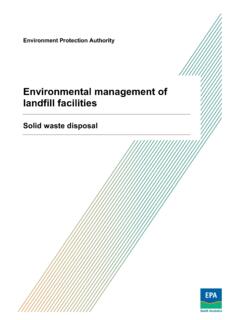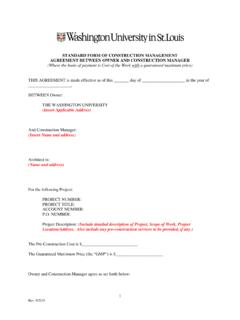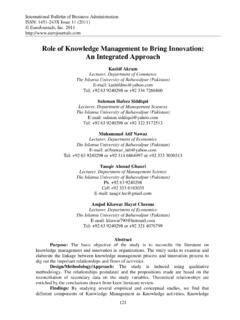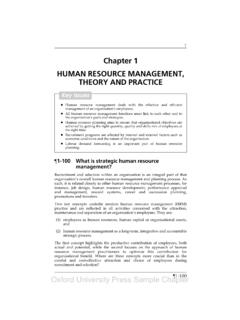Transcription of THE ROLE OF PROPERTY RIGHTS IN NATURAL RESOURCE …
1 the role OF PROPERTY RIGHTS IN NATURAL RESOURCE management , good governance AND empowerment OF THE RURAL POOR OCTOBER 2006 This publication was produced for review by the United States Agency for International Development. It was prepared by ARD, Inc. Lessons Learned: PROPERTY RIGHTS and NATURAL RESOURCE management (GLT 2) USAID Contract No. PCE-I-00-99-00001-00, Task No. 13 ARD Principal Authors: Safia Aggarwal and Kent Elbow ARD Principal Contact: Roxana Blanco ARD Home Office Address: ARD, Inc. 159 Bank Street, Suite 300, Burlington, VT 05401 Tel: 802 658-3890, Fax 802 658-4247 the role OF PROPERTY RIGHTS IN NATURAL RESOURCE management , good governance AND empowerment OF THE RURAL POOR OCTOBER 2006 DISCLAIMER The author s views expressed in this publication do not necessarily reflect the views of the United States Agency for International Development or the United States Government.
2 ROLE OF PROPERTY RIGHTS IN NRM: good governance AND empowerment OF THE RURAL POOR i CONTENTS ACRONYMS AND THE MANY TYPES OF PROPERTY RIGHTS TO NATURAL BASIC PROPERTY RIGHTS The RIGHTS PROPERTY RIGHTS TENURE SECURITY AND ENFORCEMENT OF PROPERTY OTHER IMPORTANT ASPECTS OF PROPERTY RIGHTS REGIMES AND NATURAL PROPERTY RIGHTS Systems Are PROPERTY RIGHTS to Land Versus NATURAL DISCUSSIONS AND TRENDS FROM THE PROPERTY RIGHTS IN PROPERTY RIGHTS TO LAND AND NATURAL RESOURCES: KEY FIVE KEY CHALLENGES TO A RIGHTS -BASED APPROACH FOR BETTER NATURAL RESOURCE Managing and Channeling Changing Market Harmonizing with Government Policies Focus on Building on Customary PROPERTY RIGHTS Balancing Equity and Enforcement of PROPERTY RIGHTS in a Changing GENERAL ACRONYMS AND ABBREVIATIONS CBNRM Community-Based NATURAL RESOURCE management ENRMA Expanded NATURAL Resources management Activity FAO Food and Agriculture Organization (United Nations)
3 HIV/AIDS Human Immunodeficiency Virus/Acquired Immune Deficiency Syndrome LTPR Land Tenure and PROPERTY RIGHTS NGO Nongovernmental Organization NRM NATURAL RESOURCE management NTFP Non-Timber Forest Product USAID United States Agency for International Development ii ROLE OF PROPERTY RIGHTS IN NRM: good governance AND empowerment OF THE RURAL POOR SUMMARY PROPERTY RIGHTS and the role they play in sustainable NATURAL RESOURCE management , good governance and empowerment of poor communities is gaining significant attention in development and environmental programming. Literature and practical experience are increasingly drawing attention to PROPERTY RIGHTS as an important consideration in rural empowerment and sustainable management of land and NATURAL resources.
4 Moreover, development agencies are increasingly recognizing PROPERTY RIGHTS as a critical factor determining how land and NATURAL resources are used and managed, and how benefits from these resources are distributed. The purpose of this paper is to provide an overview of critical PROPERTY RIGHTS concepts for non- PROPERTY RIGHTS specialists involved in design and implementation of NATURAL RESOURCE programs. This paper has four sections. Section 1 defines PROPERTY RIGHTS in the context of land and NATURAL resources. It illustrates why practitioners should consider PROPERTY RIGHTS when pursuing sustainable NATURAL RESOURCE management , good governance , and socioeconomic empowerment objectives. Section 2 is an overview of critical concepts in PROPERTY RIGHTS , specifically, the notion of bundles of RIGHTS , the range of PROPERTY RIGHTS regimes ( , private, community, state), the nature of PROPERTY RIGHTS and factors critical for security of RIGHTS .
5 Section 2 also provides an overview of the kinds of PROPERTY RIGHTS frequently encountered in the non-Western context, as well as PROPERTY RIGHTS reforms that many states and donors are currently implementing in the NATURAL RESOURCE and governance arena. Section 3 begins with a short series of key observations for NATURAL RESOURCE programmers about PROPERTY RIGHTS reforms. It then explores five important challenges to achieving the best fit between PROPERTY RIGHTS systems and environmental or development objectives, drawing from a variety of land and NATURAL RESOURCE sectors and issues such as agriculture, fisheries, forest RESOURCE use and biodiversity conservation. Specific topics addressed comprise managing and channeling changing market incentives; harmonizing with government policies, with a focus on decentralization and devolution; building on customary PROPERTY RIGHTS regimes; balancing equity and efficiency; and enforcement of PROPERTY RIGHTS in a changing this piece serves as an introduction to PROPERTY RIGHTS for NATURAL RESOURCE specialists, ARD s Land Tenure and PROPERTY RIGHTS Framework and associated tools may be used for guidance on operational integration of land and PROPERTY RIGHTS issues into broader development, including NATURAL RESOURCE , programs (ARD, 2005).
6 The LTPR Framework places land and PROPERTY RIGHTS concerns within the context of governance viewed broadly, economic growth, NATURAL RESOURCE management , and poverty reduction. The associated materials include: an assessment tool for identifying land and PROPERTY RIGHTS issues in any given location, a survey of land and PROPERTY RIGHTS concerns in USAID presence countries, and an assessment of the severity of PROPERTY RIGHTS issues in each of these USAID presence countries. Section 3 also analyzes specific policies, experiences and interventions where consideration of PROPERTY RIGHTS has, or could have, successfully informed and strengthened a NATURAL RESOURCE program. Finally, Section 4 summarizes key principles in land and PROPERTY RIGHTS reforms with implications for NATURAL RESOURCE management , governance and livelihood security in rural areas.
7 ROLE OF PROPERTY RIGHTS IN NRM: good governance AND empowerment OF THE RURAL POOR iii 1 INTRODUCTION PROPERTY RIGHTS or tenure refers to control over and access to resources, that is, the way in which people (individually or collectively) hold RIGHTS and responsibilities to land and NATURAL resources upon it. Thus, the issue of PROPERTY RIGHTS raises fundamental questions of who claims RIGHTS to what resources, who has access to the land and associated NATURAL resources, and who has the responsibility for managing these lands. Of particular interest then is how land and PROPERTY RIGHTS create incentives or disincentives for sustainable management and governance of NATURAL resources such as agricultural lands, forest resources, freshwater and coastal resources, wild species of plants or animals or watersheds.
8 These fundamental PROPERTY RIGHTS questions become even more critical where NATURAL RESOURCE markets are concerned, such as markets for timber or non-timber forest products, wildlife, ecotourism, agricultural products, payment for environmental services and other revenue-generating activities. Control or access to land and NATURAL resources is important for sustainable management , good governance and empowerment of the rural poor for several reasons: 1. Land and NATURAL resources are important assets for individuals and households in meeting subsistence needs including food and shelter. To that end, access to land and NATURAL resources (renewable NATURAL resources in particular) is critical for poverty alleviation and food security. 2. Land and NATURAL resources provide important assets for income generation for most rural households.
9 Rural households may generate income through production of cash crops, or from collection and sale of forest, marine or coastal resources. Indeed, households with secure RIGHTS to land are typically better off than those with insecure, limited or no land RIGHTS (FAO, 2002a). Box 1. PROPERTY RIGHTS , Access and Incentives Regarding NATURAL Resources PROPERTY RIGHTS , and secure access to and control over land and NATURAL resources can generate critical incentives for conservation and sustainable use, management and governance of NATURAL resources. Insecure, unclear, limited or short-term PROPERTY RIGHTS can inhibit sustainable land and NATURAL RESOURCE management and discourage stakeholders from acting as long-term stewards of land and NATURAL resources. 3. PROPERTY RIGHTS are a critical tool for promoting self-reliance among the poor.
10 Specifically, improved access to arable land can provide incentives for greater investments in time and labor toward enhancing the NATURAL RESOURCE base, leading to greater productivity of arable lands and hence greater food security at the household level. To that end, secure access to land and NATURAL resources is essential for lasting solutions to sustainable land and NATURAL RESOURCE use and management , as well as poverty alleviation. 4. Secure land and PROPERTY RIGHTS are a critical element of a RIGHTS -based approach to development RIGHTS -based approach to development places human RIGHTS at the center of development policy, and includes economic, social and cultural, as well as civil and political RIGHTS (Maxwell, 1999). The RIGHTS -based approach serves to ensure that program designers proactively consider women, minorities, indigenous and other marginalized groups in development programs (FAO, 2002a).






